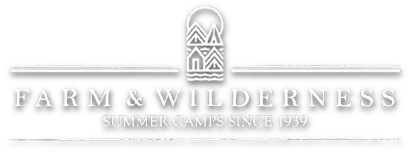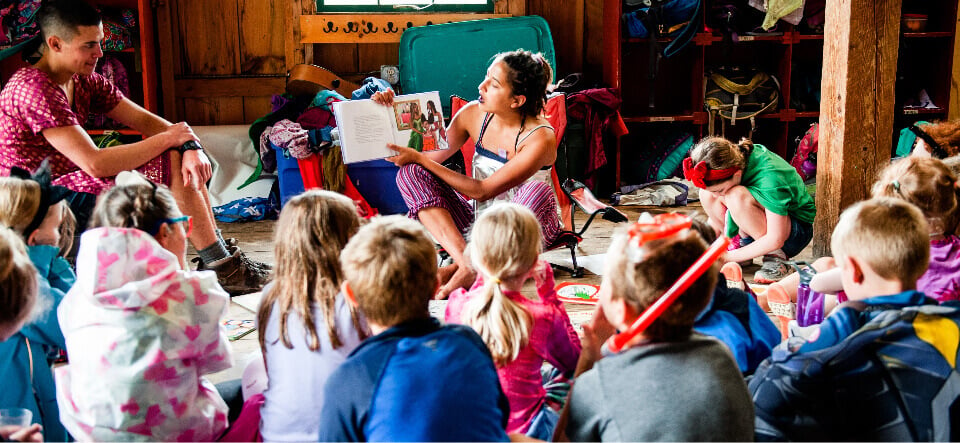ABOUT FARM & WILDERNESS
OUR MISSION AND VALUES
Simplicity, Peace, Integrity, Community, Equity, And Sustainability


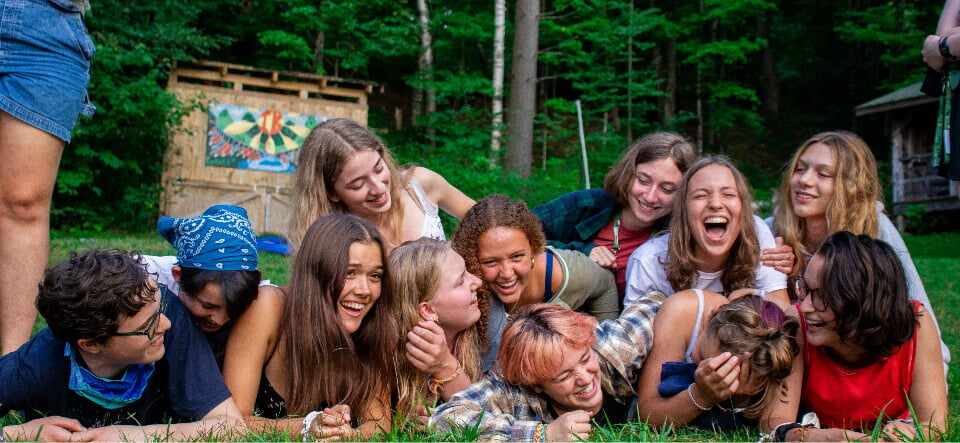
We honor our Quaker roots and are guided by Quaker values and practices:
Simplicity
We believe in the radical notion of unplugged resourcefulness and restful stillness
We minimize that which separates us from one another and the natural world
Living simply prepares each of us to find ourselves
Peace
We cultivate peace: first within ourselves, then the world
We are called to speak our truths compassionately
It’s not easy, and it’s worth the struggle
Integrity
We strive to embody our beliefs in our actions
We are mindful of our intentions and are each responsible for our impact
Keeping our word and keeping it real
Community
We gather in joyous service to each other and the land
We honor traditions that guide us and they must not bind us
Inclusivity facilitates belonging
Equity
We take our place alongside others working towards a more just world
We confront societal forces that divide, degrade, and dehumanize
The work is never done; we lift as we rise
Sustainability
We are not separate from the land, the water, and the life all around us
We work with humility for the well-being of our planet, now and for future generations
Living in nature sparks curiosity and wonder, and that’s what we’re here for.

At Farm & Wilderness summer camps in Vermont, we believe that a diverse community makes us stronger and more resilient. Our Quaker heritage lays out the concept of the ‘Light of the Spirit’ in each person and we work each year to live up to this ideal. Our goal is to provide an open and affirming space for children, young people and staff, where they feel welcomed for who they are, not feel pressured to be something else.
The Board annually reviews our Inclusivity & Equity plan. Currently, we are focused on:
- Recruiting BIPOC campers and staff through partnerships, outreach, and affiliations.
- Refining age-appropriate curricula for campers.
- Refining staff training.
- Funding and growing partnerships with organizations that share our values and commitment to experiential learning.
- Giving campers a summer that enhances their school-year activities.
- Each of our camps being a place where all campers and staff feel they belong.
Our Vermont summer camps are designed to provide age-appropriate curricula that nurtures a camper’s or teen’s sense of self and community identity, promotes each child’s comfort in socializing with people of varied backgrounds, fosters critical thought about bias, and cultivates a child’s ability to stand up in the face of bias.
Our Board of Trustees has an Inclusivity and Equity Committee. For more information on our current initiatives, please contact our Executive Director, Jay Kullman at jay@farmandwilderness.org
In accordance with Federal law and U.S. Department of Agriculture (USDA) civil rights regulations and policies, this institution is prohibited from discriminating on the basis of race, color, national origin, sex, age, disability, and reprisal or retaliation for prior civil rights activity. Not all prohibited bases apply to all programs.
Persons with disabilities who require alternative means of communication for program information (e.g., Braille, large print, audiotape, American Sign Language, etc.) should contact the responsible State or local Agency that administers the program or USDA’s TARGET Center at (202) 720-2600 (voice and TTY) or contact USDA through the Federal Relay Service at (800) 877-8339. Additionally, program information is also available in languages other than English.

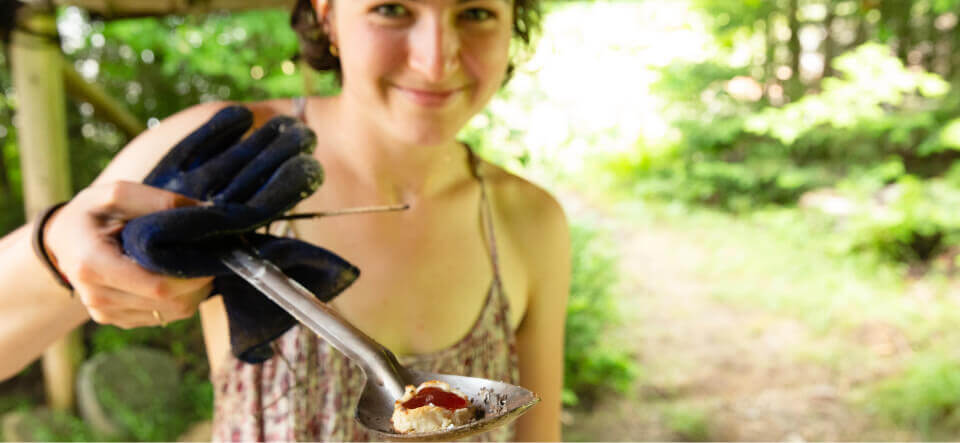
Campers consistently rate our food as one of their favorite aspects of summer camp! Meal time is an opportunity for campers to connect with friends and cabin mates, staff see how all their campers are getting along and everyone recharges on tasty food. Our kitchen staff prepare nutritious dishes that kids enjoy eating. Camp cooks often return to work at Farm & Wilderness for years. Many campers have discovered their love of cooking while helping to make bread, homemade pizzas, or a stir-fry for dozens of appreciative eaters.
We provide healthy, high quality food for our campers. We regularly accommodate a variety of dietary needs such as omnivores, vegetarians, vegans and gluten-free diets. We are also able to provide for campers with various allergies.

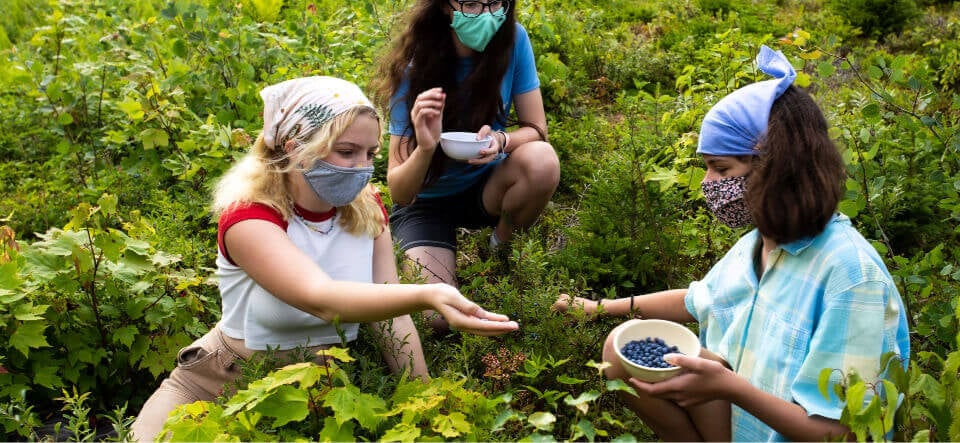
Farm & Wilderness’ farm is a typical Vermont hillside farm that is healthfully sustained. We raise a variety of livestock and each has their role and specialty on the farm. All of the Farm & Wilderness animals are lovingly cared for throughout their lives. Our farm animals play a role in keeping our fields fertilized, reducing pressure from pests, land restoration, and aiding in homesick. Each animal has a specific purpose, such as invasive species removal, producing meat, dairy, fiber, or eggs. None of the animals raised at Farm & Wilderness are considered pets, they are here to show the Farm & Wilderness community where their food comes from and what it takes to raise animals for food and fiber. It also shows a kinder, more respectful way to raise animals for consumption. They teach us about lifecycles from birth through death, responsibility and empathy for other species.
Acres of gardens are planted each spring and tended by campers during the summer. Our camp kitchens use our ecologically sound, fresh produce throughout the growing season. Fall harvest is canned, dried, or frozen for future meals. Flowers, herbs and produce are available for creative projects such as soap making, natural plant dying, and skin care products.
Our History with Sustainability
Farm & Wilderness summer camps have a long history of environmental sustainability. For years the camps have composted food scraps and there are only a few flush toilets for our staff and campers. Instead our community relies mostly on outhouses or what Farm & Wilderness folks call “Kybos.” The manure, or “humanure,” is composted and spread on a non-food crop field. This saves Farm & Wilderness an estimated 1 million gallons of water annually and the thermophilic composting process sequesters much of the carbon at the same time. Farm & Wilderness, as far as we know, is one of the only organizations to do this on such a large scale. Permission for this is granted under a Vermont Agency of Natural Resources Permit.
In 2009: We started gathering data for our first greenhouse gas audit and began developing strategies to reduce our carbon footprint. We had energy audits performed on our year-round use buildings. After reducing the heat loads we began incorporating new technologies, which included LED lighting, high-efficiency appliances, brushless motors and building heating controls to reduce consumption.
It was once common to see diesel pickup trucks driving the roads, however, we started using electric golf carts in 2010. The culmination of these strategies has reduced Farm & Wilderness carbon emissions by 31% as of 2016. More significantly, due to an increase in campers and staff, over 42% per capita.
In 2014: The TF boiler plant was constructed. The Farm & Wilderness main campus is on a 600-acre parcel and consequently, there are a significant number of dying or “hazard trees” on the property. These trees along with construction waste are used to generate heat and hot water for the Tamarack Farmhouse.
In 2015: We received a grant from Green Mountain Power (GMP) to install solar panels on the Tamarack Farmhouse roof, producing over 18,000 kWhrs annually, more than the building uses.
In 2017: A solar array was constructed behind the Sustainable Resources Building providing the additional 80,000 kWhrs Farm & Wilderness uses annually.
Looking ahead we are excited to continue our partnership with Efficiency Vermont and GMP. We have participated in two pilot programs, one testing heat pumps to reduce loads on the grid and the other using batteries to flatten electrical “peak demand”. This battery also serves as the backup at our dairy plant in the event of a power outage.
For more information check out our Resource blog, recycling a truck or get the details of our GHG audit in the annual report.

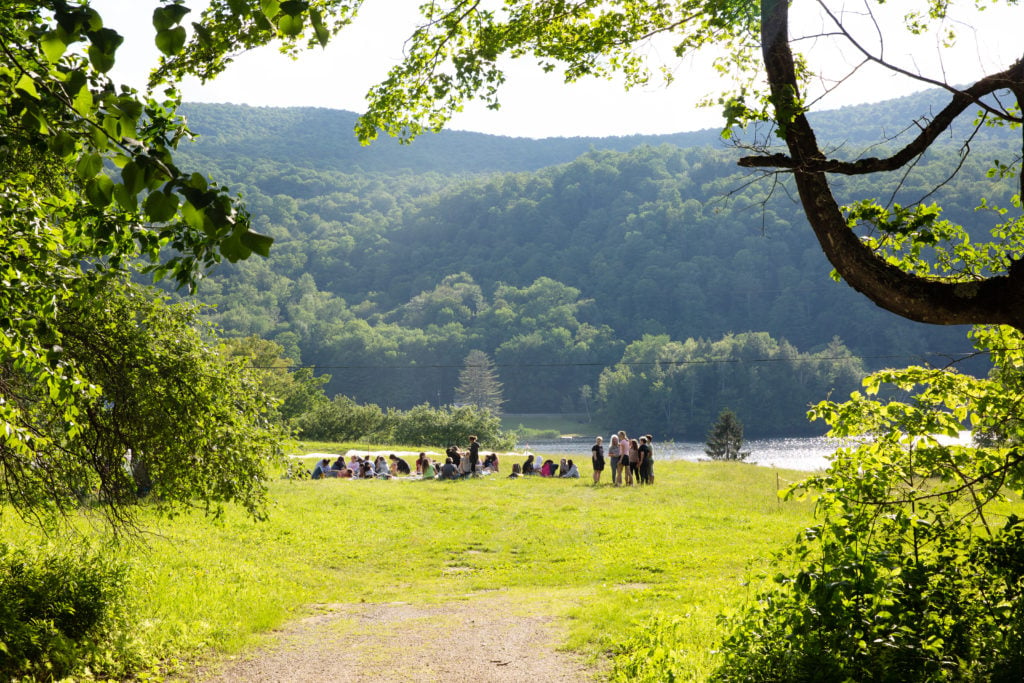
Farm & Wilderness manages approximately 4,800 acres of forests through goals of sustainable timber production and enhanced wildlife habitat.
Our setting is a living laboratory providing opportunities for campers, teens and staff to learn about the forests, wildlife and adventures outdoors.
In our forests, Farm & Wilderness attempts to mimic the same changes that occur as woodlands age, undisturbed. We harvest trees near maturity to create an open space for seedlings to get established and manage our woodland to encourage quality trees to reach maximum growth. Our harvested wood is used for building projects at Farm & Wilderness and sold at local sawmills. Woodward Reservoir and the surrounding lands are managed annually for preventing invasive species.

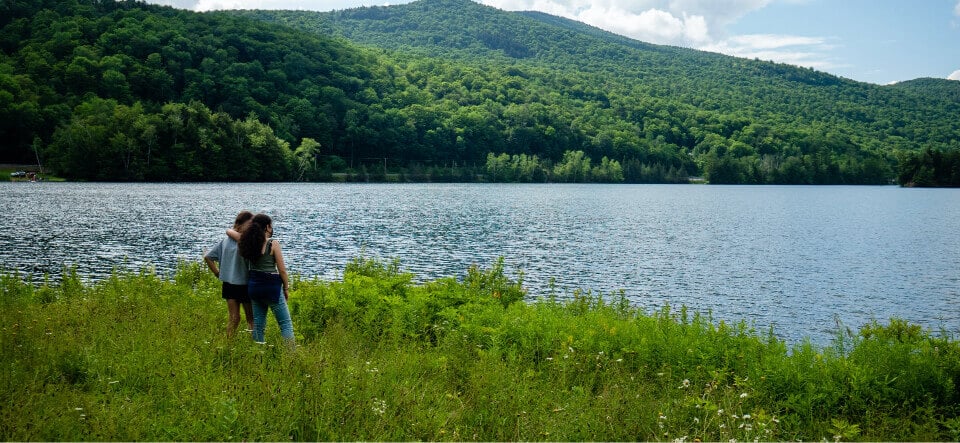
Farm & Wilderness Conservation
Born From The Ninevah Foundation
In May of 2018, Farm & Wilderness and the Ninevah Foundation formally joined forces, run by a common board of trustees, dedicated to the education of children and teens in eight programs through six summer camps to engage in caring for the environment. The Ninevah Foundation conserves more than 3,000 acres around Lake Ninevah and Saltash Mountain in Mount Holly and Plymouth, Vermont.
As of spring 2022, the Board of Trustees of Farm & Wilderness Foundation and Ninevah Foundation is thrilled to share that it has committed to expand our conservation efforts. The incredible work under the Ninevah Foundation will be expanded to include 4,800 acres of land around Lake Ninevah and Farm & Wilderness camps in Plymouth and will now be called Farm & Wilderness Conservation, Inc.
The Board believes expanded, focused conservation efforts of Farm & Wilderness Conservation, Inc. will increase opportunities for financial support and partnerships. The Board also recognized an opportunity to streamline conservation and camp / programming operations. You can read more about the history behind the birth of FWC here!
